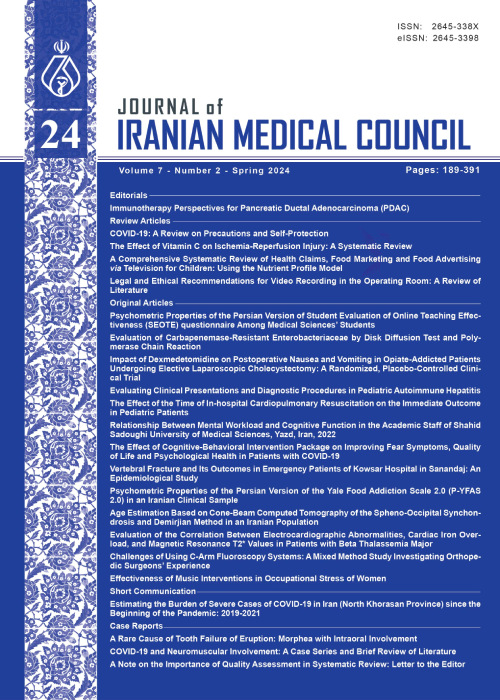Toward Personalized Psychiatry: Integrating Pharmacogenetics into Psychiatry
Psychiatric disorders are a major health problem in individual and societal aspects, due to their considerable prevalence and burden and treatment issues (1-3). Estimates indicated that about 792 million people, equivalent to 10.7% of the world population, had mental health disorders in 2017 (4). In 2019, mental disorders were among the top ten causes of burden worldwide, as before, and the Disability-Adjusted Life-Years (DALYs) attributed to them was 418 million (16% of global DALYs) (5,6). The associated economic costs have been estimated at $4.7 trillion – even up to $10 trillion (6). These statistics are related to disorders whose medications and alternative treatments have incomplete efficacy and debilitating side effects that result in limitations in both therapy and compliance so that only one-third of patients with major psychiatric disorders achieve complete and stable symptom remission (7). These data make access to a predictive tool of treatment response crucial and desirable. The uniqueness of each person along with the heterogeneity of diseases is the basis of the concept of personalized medicine, in which personalized psychiatry pursues the trends (8,9). Genetics is responsible for 20 to 95% of the variation in medication disposition and pharmacodynamics in the central nervous system (7). Each patient’s unique phenotype, comorbidities, dietary habits, and medication habits can potentially cause changes in the pharmacokinetics and pharmacodynamics of medications. Personalized psychiatry was presented to provide an individually adapted approach for prevention, diagnosis, treatment, follow-up, and rehabilitation. Parts of these depend on developing pharmacogenomics and pharmacogenetics (8,9). The study of the genetic causes of variation among patients in response to medications and the study of the simultaneous effects of multiple mutations in the genome determining the response to medications are called pharmacogenetic and pharmacogenomic, respectively. However, there is no consensus on the difference between the two, and in practice, they overlap (9). Personalized psychiatry that relates the response to medication to its pharmacokinetic and pharmacodynamic changes as a result of the patient’s genotype, in principle, indicates the application of pharmacogenetics in treatment. The primary focus of the pharmacogenetic-psychiatry link has been the YP2D6, CYP2C19, and CYP3A4 enzymes in the liver because of their responsibility for the metabolism of most antidepressants and antipsychotics (7,8). The translation of pharmacogenetic evidence into clinical practice is an important endeavor that began a few years ago. An example of the application of pharmacogenetic information to guide pharmacotherapy in psychiatry is using genetic information on CYP2D6, CYP2C19, CYP1A2, SLC6A4, and HTR2A for dosing, which increased the number of responders to antidepressants in a pioneering study. Overall, pharmacogenetically supported depression improvement was reported to be 1.71 times better than usual. Similarly for antipsychotics, the association of CYP2D6 genotype and risperidone in order to individualize dosing has been shown in a large-scale study. This evidence has grown and matured to the point where guidelines for implementation have been provided. Its psychiatry examples are the Dutch Pharmacogenetics Working Group recommendations regarding CYP2D6 and CYP2C19 genotypes for antidepressants and antipsychotics and the guidance for using genetic information in pharmacotherapy for psychiatry published by The Clinical Pharmacogenetic Implementation Consortium (7,10). In the application of pharmacogenetics in personalized medicine, attention to cost-effectiveness and ethical issues is essential. It seems that having a genetic passport providing polymorphic genes involved in common medications in which dosing is important, after full maturity and reaching the certainty of the evidence, is cost-effective. In other words, in this case, an advantage of integrating pharmacogenetics and psychiatry would be to reduce costs (7). In regard to ethical issues, the guidelines and instructions should be complied in a way so that ethical obstacles such as privacy and confidentiality and knowledge gap and informed consent are overcome, a balance between social and individual interests is established, and ethical decisions are also personalized (11,12). In conclusion, beneficial and adverse effects are intrinsic properties of medications, and pharmacogenetics can increase the possibilities of improving effectiveness and reducing risk. As a result, although the risk-benefit ratio cannot be guaranteed in a patient, it improves in the population. Moreover, determining the patient’s genotype may reduce the time needed to identify the correct medication and its dosage and minimize exposure to ineffective medications. Although the clinical applications of pharmacogenetics are certain, the use of all currently proposed genes is not consensus. In the future, pharmacogenetics can be extended to other genes, encoding enzymes, transporters, receptors, and other downstream molecules. Keywords Behavioral science, Cost effectiveness, Ethical issue, Genetics, Mental disorder, Personalized medicine, Pharmacogenomics, Precision medicine Acknowledgements This paper did not receive any specific grant from public, commercial, or not-for-profit funding agencies. Conflict of Interest The authors had no competing interests.
- حق عضویت دریافتی صرف حمایت از نشریات عضو و نگهداری، تکمیل و توسعه مگیران میشود.
- پرداخت حق اشتراک و دانلود مقالات اجازه بازنشر آن در سایر رسانههای چاپی و دیجیتال را به کاربر نمیدهد.


